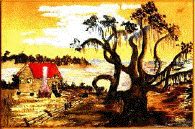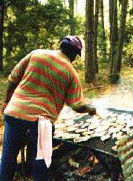 |
I Am SapeloBy Cornelia Bailey
Sapelo Island, Georgia
|
I am here
to represent Sapelo Island, a little hammock on the Georgia Coast. It's
a dying form of life we have here. In some ways I relish the new way
while at the same time I feel such a heavy loss for the vanishing of the
old ways.
Life on Sapelo goes on much as it
does anywhere else, but if you get to really see and feel what's here,
you will see the difference. The proud faces as well as the angry walk,
the easy smile as well as the hard frown, the easy life as well as the
hardship, it's all there reflected in the faces and stature of each
individual. The old who don't want to change and the young who does. But
get to know the young ones and you will see tradition and hear pride.
We
are all proud of our heritage.
I can still see the ladies at such places as
Raccoon Bluff fishing with a drop line and cane pole from a batteau
boat, while trusting in the Lord because they couldn't swim; the men
fishing at night with flambeau, looking for alligators with a long pole
& giant hook.
I remember the call of my Grandmother as
she called my sister from King Savannah; the smell and sweat of the men
as they walked behind oxen, horses and mules plowing task after task of
fields; the Friday night hot suppers with music and food and dances
like the Buzzard Lope.
I can drive a horse and
wagon as well as a car, I can use a garden hoe as well as a tiller and I
can cook better on a wood stove than an electric one. Modern is good but
old fashioned ways and ideas have built many a strong foundation for our
young people of Sapelo, their lives are rich.
CORNELIA & VIOLA JOHNSON
B. J. CONFECTIONARY
We don't want to lose the meaning of what a lot of gnats mean, how
fresh-dug sweet potatoes taste cooked in hot ashes. I am Sapelo and all
the hundreds of others who are descendants; we who remain here is
Sapelo. We are one, bound by the spirit of an island and Bulallah the
slave. Bound by high tide, fields, gossips, smoke mullet, and our faith.
And I musn't forget we are all surrounded by big water
and have to be
close to each other, real close!
The things we used to do!
I remember as a kid sitting in the corner and watching Papa and his
friends dance the Buzzard Lope. They all got together on Friday and
Saturday night with their moonshine. They were blowing the comb, some
playing the guitar, some doing the soft shoe, the tap dance, and one
trying to outdo the other in dancing.
We didn't join in but it was fun watching them. Even if
Papa used to come home late at night some of these fellows would follow
him back home and we'd get up out of bed just to watch them. Get up and
sit in a corner someplace and watch them do their thing until they'd
fall asleep or leave and go back home. And so we'd learn from all that.
The next day we'd be trying to blow the comb, we'd get outside and try
our best to imitate that comb!
Mama would talk about
Grandpa Bryan. He was a mysterious fellow, being one half Creek and one
half African and they say he came from the Okefenokee Swamp. He'd sell
Blair Products and he would measure men for suits and shoes and actually
cut their hair with a bowl! I remember as if it were yesterday. He used
to cut Mr. Allan Walker's hair. He would go in the kitchen and get him a
bowl. Well, he'd sit it up there on Mr. Allan Walker's head and he would
clip all around it and then he'd take the bowl off he'd trim it down a
little bit more, and his neck would have a perfectly straight line!
THE CHURCH AT RACCOON BLUFF
BY ERNEST BUTTS, JR.
Mr. Walker would get up in church on Sunday and these kids would be so
tickled. He'd just had his hair cut with the bowl. He's get up (he was a
very proper old man) and he's say, "My fellow constituents..." - what
the heck is constituents? When you're little - six and seven years old -
matter of fact the majority of the church didn't know what constituents
mean. You're talking to people who never went to school or went as far
as the third grade and I don't think they used the word constituents in
the third grade! Even back then when lessons were harder.
The
songs we used to sing in church we've been singing for years and years.
Nobody really goes to the hymnbook, they sing from memory. When Grandma
would sing, she had a captivated audience. She's sing "When I get To
Heaven" and "The Things I Used To Do". That was when I was little. I
haven't heard Mama sing in years but she used to sing with Grandma.
Though Grandma would be tipsy, Mama never drink
but she'd sing with her
anyhow.
|

-FRANK'S SMOKED MULLET- |
Papa would sing once in a while around the house but he wasn't much on
singing. He's just sit down and tell us stories and build his homemade
nets and fox traps and cook hominy grits for us. That was his treat,
cooking hominy grits for us. Papa provided for us the best he could. We
had alligator dishes along with pork greens. We had game birds and shore
birds - wild turkey and gannet. We had fish of all kinds, we had turtle
of all kinds. We had deer, squirrel, rabbit, raccoon, and possum. Some
only in season, some by means of poaching. Sometimes nothing at all.
Papa showed us how to take the bladder from a fresh-killed hog and
make a balloon out of it by rolling it in warm ashes until it was thin,
and then blowing it up - our first balloon! Or how to make a whistle
from a spent shell. Or whittling a toy for us to play with. Or bringing
home a pocketful of kumquats from around the Reynolds' mansion. |
REYNOLDS MANSION
SOUTH END
First, Sapelo was described as
a haven for slaves, then a paradise for the Black families that lives
here. Where is the paradise on Sapelo? Where? Maybe for those who don't
have to live here they can see paradise, we can't. Our schools are all
close down, our former communities are gone. Our churches have only a
handful of worshippers left. Our organizations such as the Farmers
Alliance, Masonic, Eastern Stars are gone. Why?
Because the people are
all gone.
Sunday nights, Tuesday nights and Thursday nights were prayer
meeting nights at the local prayer houses. There are no more prayer
houses. No more hot supper nights where the boys and girls meet, there
are no more boys and girls to giggle in the dark under the stars, with a
chorus of frogs and crickets for company.
Even our ghosts
don't walk anymore. There are no one for them to scare now, no one walks
the road at night, no jack o'lantern to lead the weak-minded or
drunk-minded away to some dark woods for a night of fright.
Nothing is left, but then again we who remain is here still. We still
drink, love, hate, and remember we are still living for our ancestors.
My eyes water, my mind race and I get sad and angry. There are no more
sawmills, no more cowboys, no one to tap the graceful pine trees - no
more cotton, no more old-fashion anything. No more midnight fishing or
alligator hunting with a long pole.
SAPELO ISLAND CULTURE DAY
FARMERS ALLIANCE BUILDING
But once reminded, we can remember the rest. For in many ways we
are still living in the days of the Buckra house and the Buckra fields.
I am still in Massa fields. I can see and hear traces of the old days
but there in those fields I can also retain my dignity and be myself
without undo influences. It's not easy, but I watch the birds and my
mind is free, even if the rest of me have committances.
|

